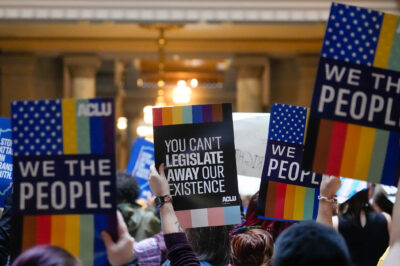
In what U.S. city was a woman targeted, forced off a plane, detained and strip searched solely based on her ethnicity?
Which company released a transparency report on the number of government requests for customer information this week?
How many restrictions to abortions did state politicians pass from 2011-2012 (40 years after Roe v. Wade)?
When was the most recent federal law concerning the privacy of your electronic communications (like e-mail and Facebook) enacted?
Which Vermont Senator spoke this week on the link between mandatory minimums and mass incarceration?
Some Real Shock and Awe: Racially Profiled and Cuffed in Detroit
Targeted because of her ethnicity alone, ACLU plaintiff Shoshana Hebshi was handcuffed, forced at gunpoint off her Frontier flight, and strip-searched. This week, Shoshana filed a lawsuit against Frontier Airlines, Detroit Metro Airport officials and federal authorities for her unlawful arrest and detention. Shoshana writes about how she felt as a victim of racial profiling and discrimination and why she is fighting for equality.
Hurray for Google Transparency, Now Where is Everyone Else?
Google released its latest transparency report this week. They’ve made some interesting additions, and the overall number of government requests is on the rise. Before we get to that, however, there is one overriding point: kudos to Google, but where is everybody else? The only other major company to release this type of data is Twitter. Where are Verizon and Facebook and Microsoft? How about AT&T, Amazon or Comcast? The list is endless but the salient fact is that Google has paved the way (this is their 7th report) and there hasn’t exactly been a stampede to follow suit.
Forty Years After Roe, the American People Have Spoken. Will Politicians Finally Listen?
Forty years ago this week, the Supreme Court decided Roe v. Wade, the landmark case giving a pregnant woman the right to make her own decision about whether to have a child or have an abortion. Since then, some politicians have been trying to take that decision out of a woman’s hands. These efforts have reached record levels in recent months. In just two short years, our elected representatives found the time to pass over 130 provisions designed to interfere with a woman and her family’s private decision about abortion.
The Kelleys’ Cautionary Tale: Electronic Privacy Matters
In November, Jill Kelley and her husband Scott woke up to find themselves at the heart of a scandal that would ultimately lead to the resignation of CIA Director David Petraeus. An extramarital affair between Petraeus and his biographer, Paula Broadwell, engulfed another high-ranking military official, U.S. Marine Gen. John Allen, in allegations of “inappropriate communications” with Mrs. Kelley.
The Kelleys’ ordeal, however, has made them particularly sensitive to a fight the ACLU has been helping to wage for years: erecting new protections for American’s electronic communications. That fight, as the Kelleys explain, aims at modernizing the Electronic Communications Privacy Act (ECPA). Enacted in 1986, when cellphones were the size of your head, the law has not kept pace with technology and allows the feds to access citizens’ electronic communications under a far lower standard than physical mail, which requires a warrant.
Senator Leahy Says “No” to Mandatory Minimums, But Will Congress Listen?
Taking issue with America’s position as the world’s largest jailer, Senator Patrick Leahy (D-VT) spoke to a group of Georgetown Law Students late last week about his vision for the Judiciary Committee’s agenda in the 113th Congress. In a speech that covered a broad range of topics from immigration the use of drones, Senator Leahy spent a great deal of time on a topic that increasingly impacts all of us: a criminal justice system seemingly fueled by an addiction to incarceration.
Mandatory minimums require specific prison terms for certain offenses. If proven, a judge has very little choice but to sentence a person to the specified term. Half of the federal prison population is serving these lengthy sentences for drug convictions, many of whom have little to no history of violence or prior arrest, and who in a less punitively-focused system might have been rehabilitated through drug treatment programs.
Learn more about your civil liberties: Sign up for breaking news alerts, follow us on Twitter, and like us on Facebook.



